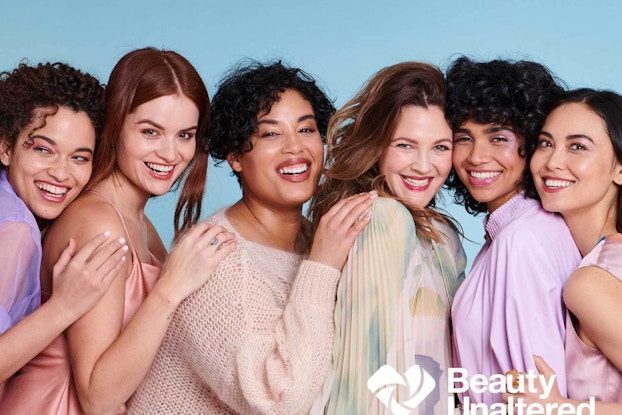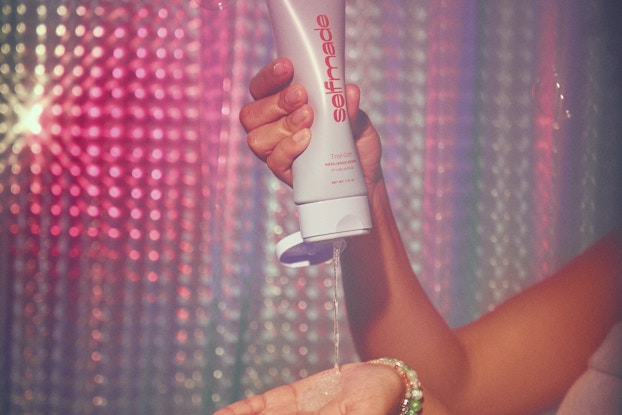
Why it matters:
- As the pandemic took a toll on consumers’ mental health, it also compromised their self-image: One in three women said they feel less confident in their appearance than they did a year ago, citing video calls and altered social media images as key contributors, according to a CVS study.
- Against that backdrop, startups to national retailers are developing products and beauty departments that reflect more inclusive, realistic and authentic representations of beauty.
- CVS is working with brands to redefine beauty standards in its aisles to engender healthier self-esteem in a new generation of shoppers; startup Geenie is curating beauty products from marginalized groups that include Black-owned and LGBTQ-owned brands; and DTC startup Selfmade is partnering with mental health experts on products and programming.
The beauty industry has always had a relationship to its consumers’ mental health, though not necessarily always a positive one: Via imagery and messaging, it’s long promoted conventional notions of model looks as the beauty ideal, notoriously stoking body-image and self-esteem issues in those who might not fit the mold.
Now a new class of brands and retailers, from massive drugstore chains to startup skin care labels, are taking consumers’ mental health into account from the get-go, developing products and marketing campaigns that espouse more inclusive and authentic representations of beauty.
Much of this shift is related to the impact of the pandemic on the consumer psyche, says Alex Hawkins, senior foresight writer at strategic foresight consultancy, The Future Laboratory. “Over the last year, skin care and beauty routines have taken on a new significance as people increasingly connect the dots between their mental, physical and emotional health," he told CO—.
“Some brands are developing products with therapists and experts, while others are committing funds to raising awareness of the connection between mental and skin health,” Hawkins continued. “All of this suggests that beauty brands have a new role to play in supporting people’s wellbeing at a more fundamental level.”
[Read here for examples of how to support employee wellness.]

CVS: Aiming for a beauty aisle that promotes consumers’ healthy self-image
Pharmacy chain CVS has taken on mental health as part of its overall bid to support customers’ wellness and well-being. In 2018, the company reached its Beauty Mark goal of full transparency for imagery in its beauty department to reflect more authentic beauty standards.
“We made the decision to focus on transparency around material alterations in post-production [of photos] because we believed we could make a significant positive impact on the mental health issues that data has linked to misleading images,” Andrea Harrison, vice president of merchandising, beauty and personal care for CVS Health, told CO—.
Now, the company is focused on its next phase. Earlier this year, CVS partnered with media psychologist Dr. Pamela Rutledge to conduct a survey on the effects of increased screen time on consumers’ mental wellness and self-image, and the findings weren’t pretty. For example, “one in three women feel less confident in their appearance than a year ago, and video calls and altered social media images are major contributors,” Harrison said.
We want our customers to come into the store and feel better about themselves because they have realistic expectations. And we’ve worked with brand partners to reflect a more authentic representation of beauty, redefine industry standards and create a healthier self-esteem for a new generation.Andrea Harrison, vice president of merchandising, beauty and personal care, CVS Health
“The impact of negative emotions can be far reaching,” Dr. Rutledge added. “Luckily,” however, “taking care of ourselves has psychological and physiological benefits that improve our mood and can positively impact self-image,” she said.
For one, according to the CVS-sponsored study, 83% of women ages 18 to 35 agreed that they feel better about themselves when they do a beauty routine — and businesses should take note, Dr. Rutledge said. “Self-image is at the core of that well-being, and brands have an opportunity to make promoting a healthy self-image and positive values to the next generation a strategic priority."

Beauty and personal care products are already inherently emotional: ‘Your mental and emotional well-being have a direct correlation to your skin and body function’
Beauty industry veteran and former staffer in Michelle Obama’s White House, entrepreneur Stephanie Lee, set out to create a skin care brand that doesn’t just speak to mental health in its marketing, but actually considers it from the very beginning stages of product development. The result is Selfmade, a growing line of products designed with active ingredients and messaging to support users’ emotional well-being, as well as the health of their skin.
“Your mental and emotional well-being has a direct correlation to your skin and body function,” Lee told CO—. “So much of how beauty has positioned itself is about self-expression, but how do you do that if you don't know yourself? That's where we really position ourselves in the customer journey.”
Each product is also linked to programming created in partnership with mental health experts, including psychologists and psychiatrists, around self-exploration and conversation related to the specific issue it is designed to address.
For example, Selfmade lists the features of its True Grit Resilience Scrub, which aims to restore skin to a “stress-free state,” along with a “daily ritual” to use it. After each biweekly scrub with True Grit, consumers are directed to “self-reflect” and take a “mindful minute” to ask themselves, “What would you do if you knew you couldn’t fail?”
“I think that's the major opportunity with us is that we get to really use each product as a point of discourse where these conversations are already happening,” Lee said. “I think the conversation around mental health and emotional well-being is never ending."

Though Lee herself is a millennial, she understands that even younger consumers are often the ones driving the discussions around mental health. A 2020 study conducted by the Centers for Disease Control and Prevention found that 63% of adults ages 18 to 24 reported increased anxiety and depression around the pandemic. In addition to a panel of medical and mental health advisors, Selfmade also boasts an “advisory board” of diverse Gen Z consumers to help shape future product development and brand positioning.
The impact of inclusivity in beauty
For Chana Ginelle Ewing, founder of Geenie, which enables consumers to shop beauty brands from people of color, the LBGTQ community and other underrepresented groups, beauty and mental health are as interconnected as the beauty industry’s embrace of Eurocentric beauty standards, she said.
As the industry as a whole works to unpack those standards that have long excluded people of color, it is also coming to terms with the impact of them on the self-esteem of non-white consumers. “Now, there's more of a consciousness raising in the industry,” she said, “whereas before, people would create products and not necessarily talk about their responsibility to their audiences, or what it means to be inclusive.”
Ewing believes that the move towards inclusivity within the beauty industry offers more opportunities for people of color to feel good via the brands they interact with and the products they use. That’s a step in the right direction in marketing beauty with an eye toward mental wellness, she said.
For its part, Geenie curates products by “identity, ingredients and impact.” Consumers can purchase from identity-driven beauty companies such as “Black Owned,” “Indigenous Owned” and “Disabled Owned” brands. They can also buy according to ingredient designations such as “sustainable” and “vegan,” and via cause-led businesses that promote “gender expansiveness” and “fat positivity” to “give-back” brands that address key social issues via financial donations and other philanthropic initiatives.
[Read here on 10 small business ideas for beauty entrepreneurs.]

Shaping the beauty industry of the future
In a changing beauty landscape, "Brands need to think carefully about where they fit into their consumers emotional lives, rather than simply appealing to appearances and aesthetics,” The Future Laboratory’s Hawkins said. Industry leaders like CVS’ Harrison seem to be taking that insight to heart, influencing its brand partners along the way.
“Looking forward, we’re encouraged to see signs that the work we’ve done will continue to influence our suppliers and the industry,” she said. “We want our customers to come into the store and feel better about themselves because they have realistic expectations,” Harrison said. “And we’ve worked with brand partners to reflect a more authentic representation of beauty, redefine industry standards and create a healthier self-esteem for a new generation.”
CO— aims to bring you inspiration from leading respected experts. However, before making any business decision, you should consult a professional who can advise you based on your individual situation.
Follow us on Instagram for more expert tips & business owners’ stories.
CO—is committed to helping you start, run and grow your small business. Learn more about the benefits of small business membership in the U.S. Chamber of Commerce, here.









